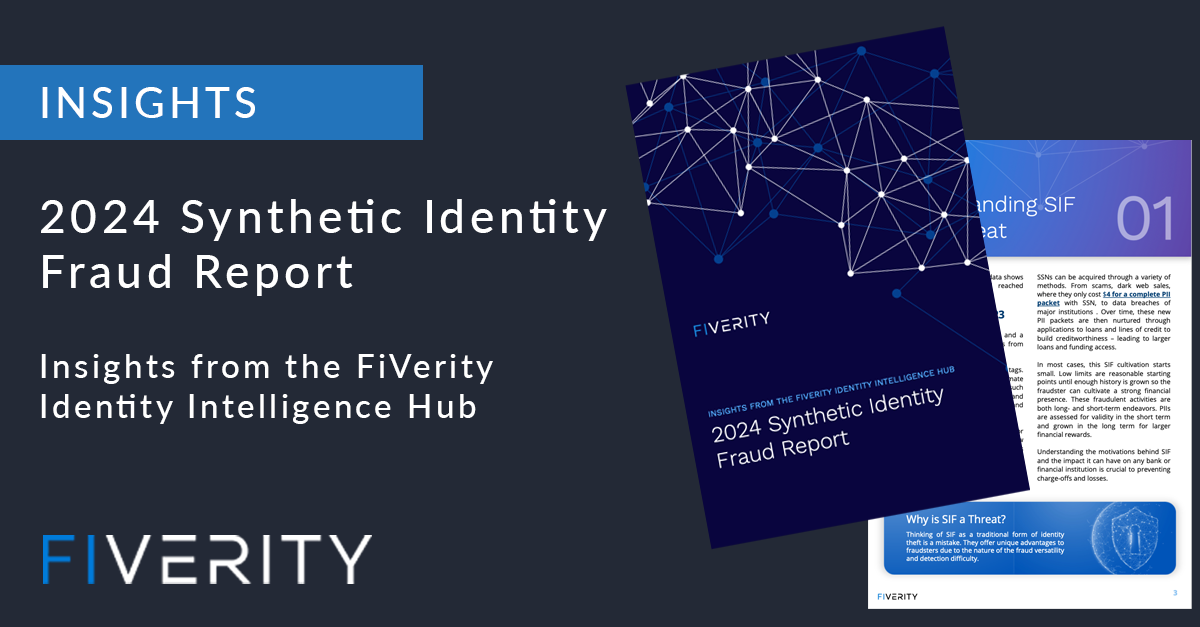Stopping fraud is hard.
Stopping it alone is harder.
FiVerity connects your fraud systems, data, and teams—internally and externally—to turn fragmented detection into real-time response and prevention.
A Modern Approach to Banking Security
Leveraging real-time data-sharing from diverse sources such as fraud detection systems, risk assessments, credit bureaus, and financial institutions—FiVerity uses advanced AI and machine learning to provide actionable insights for more comprehensive verification and fraud detection across KYC, CIP, and monitoring. Enhancing security, reducing fraud, and improving compliance with regulatory standards.
Today's Fraud Challenge
Fraudsters work together using advanced technologies, such as automation and Generative AI, to come up with creative ways to target financial institutions and their customers or members, outpacing their ability to react.
Increasing Sophistication
Fraudsters are quick to adapt, finding new ways to evade detection, making it hard to keep up.
Limited Prevention Resources
Limited by privacy regulations and budgets, financial institutions rely solely on their own unstructured data.
Fraudster Ecosystem & Automation
Advancements in technology enable fraudsters to work with unprecedented efficacy and scale.
Government Recognition
Recognized as the top solution for the Effectiveness & Impact Category in the FinCEN / FDIC Tech Sprint.
What Can Anti-Fraud Collaboration Do For You?
Enhance Security
Provides advanced fraud detection and prevention using real-time data sharing and AI-driven insights, ensuring a secure financial environment and protecting against sophisticated fraud schemes.
Comprehensive Fraud Management
Integrates data from multiple sources to provide a unified, real-time view of fraud risk. This empowers financial institutions to detect fraud with more accuracy and stay ahead of emerging threats.
Enhanced Reporting
Integrates KYC, CIP, and continuous monitoring to ensure understanding throughout the organization, minimizing the risk of legal and financial penalties while maintaining operational integrity.
See How It Works
“ ”
"FiVerity’s sharing capabilities unlock an entirely new dimension for our detection and prevention models. Simultaneously, the platform will be a key pillar in the broader fraud industry where participants will help build global standards and classifications, which has been long overdue."
—
Andrew Stone, SVP, Fraud Management
BHG Financial
Tackling All Forms of Fraud with Unparalleled Precision
Identity theft
Check Fraud
Account Takeovers
Deposit Fraud
Synthetic identities
Friendly Fraud
Money Mules
ach transfers
Who Can Benefit from FiVerity?
FiVerity helps all types of financial institutions and fintech companies prevent fraud. Learn more about FiVerity industry solutions.
Community Banks
Team up to leverage the expertise and resources of both the banks in your area as well as national banks to better protect customer assets.
Credit Unions
Find undetected fraud within consumer loan portfolios to prevent losses while approving loan applications efficiently, effectively, and confidently.
Digital Banks
Keep up with new and evolving criminal tactics in real-time, and identify fraudsters before they reach your account opening page.
Fintech & eCommerce
Stay one step ahead of fraudsters trying to take advantage of the explosion in online transactions with an intelligent, automated approach.
Protection Throughout Your Business
FiVerity helps financial institutions strengthen a range of consumer-facing business processes.
Existing Portfolio
Identify fraudulent and high-risk accounts within your existing portfolio to prevent bust outs and limit damage.
Account Opening
Prevent fraudulent accounts from entering your system and establishing report.
Point of Transaction
Protects your customers and accounts from transacting with fraudulent or stolen identities.
A community of experts
FiVerity is actively engaged with a diverse community of public and private institutions to share best practices in fraud detection, sharpening our ability to monitor, anticipate, and counteract fraudulent activities while remaining compliant with data privacy regulations. The result? More robust, reliable, and cutting-edge fraud prevention for the financial services industry.

“FiVerity helps us take an aggressive approach to fraud detection. The platform’s flexibility is critical to meet the needs of our expanding product lines, and working together with innovative fintechs like FiVerity helps keep us on the leading edge."
Michael Butler
CEO
Grasshopper Bank

"FiVerity’s sharing capabilities unlock an entirely new dimension for our detection and prevention models. Simultaneously, the platform will be a key pillar in the broader fraud industry where participants will help build global standards and classifications, which has been long overdue."
Andrew Stone
SVP of Fraud Management
BHG Financial

“DCU was initially impressed with the adaptability of FiVerity's AI-based models and ease of deployment. Now that it's been in production with daily use by our Fraud Investigation team, we've only grown more impressed."
Gregg Stephens
Fraud & BSA Manager
Digital Federal Credit Union


















